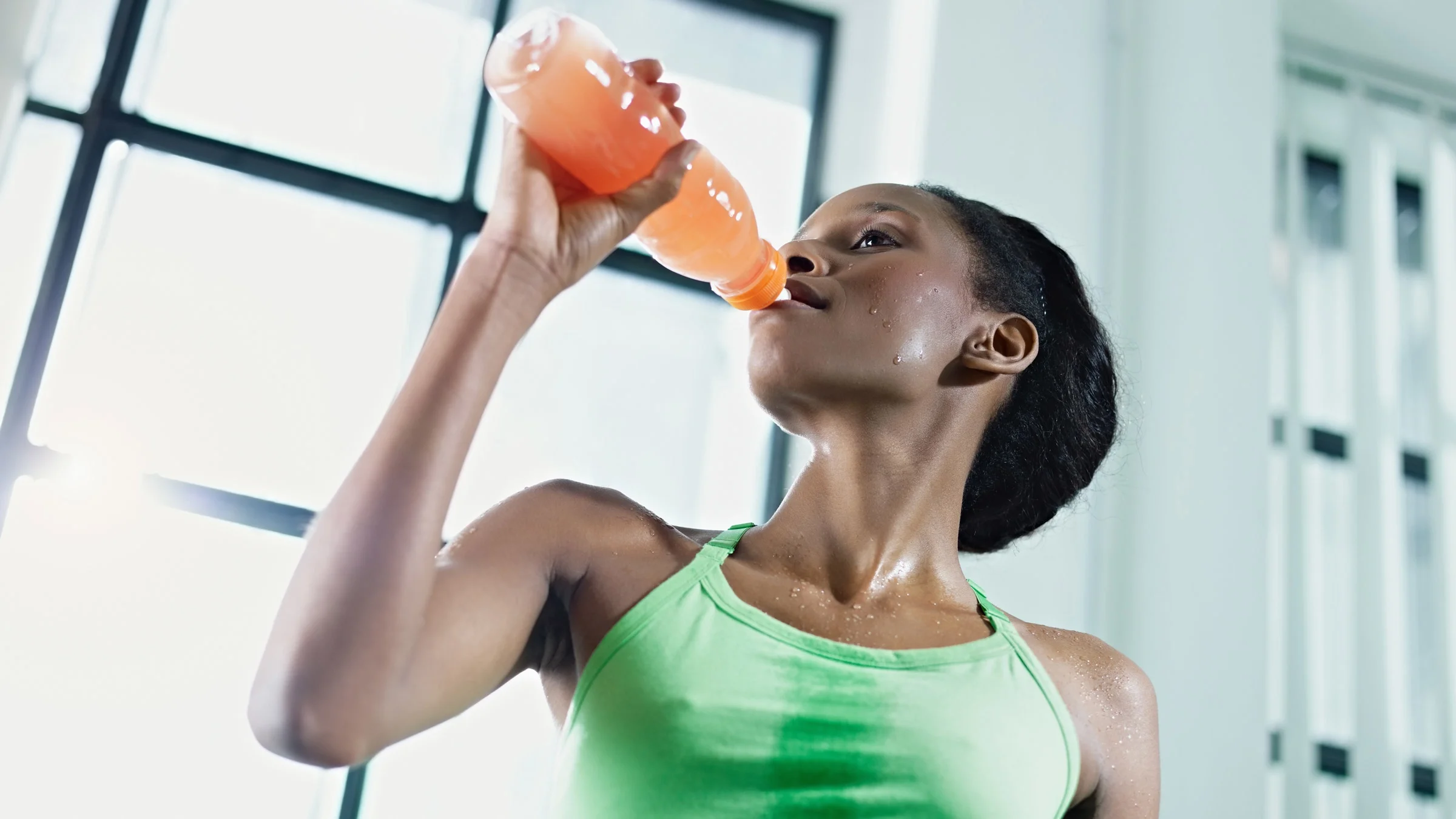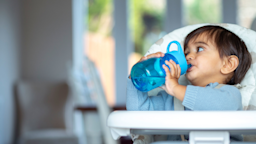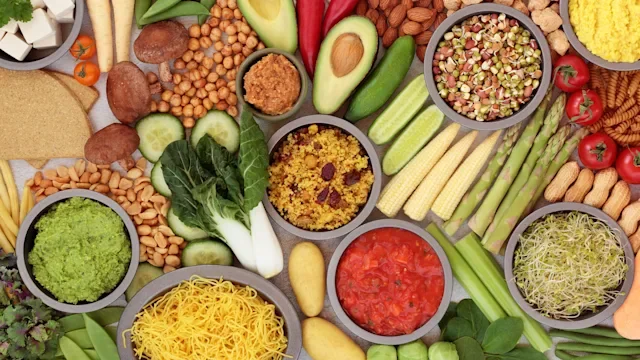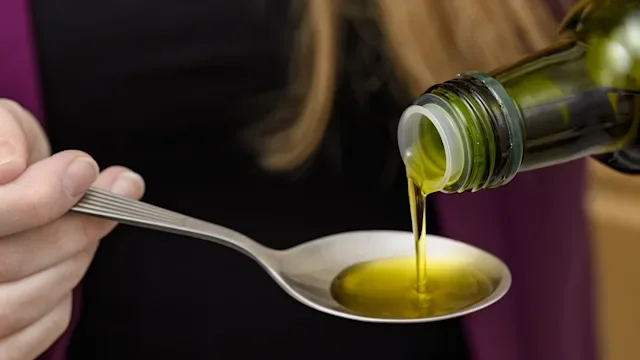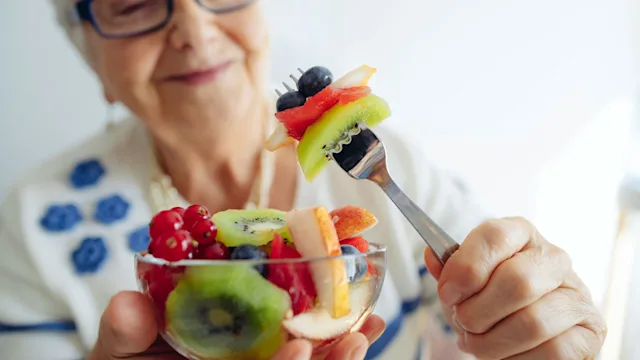Key takeaways:
For most people, water is ideal for hydration. The lack of sugar and other additives makes it one of your best options.
Other drinks can also help you stay hydrated. Some examples of hydrating drinks include coconut water, smoothies, and broth.
If you do a lot of intense exercise, consider a post-workout beverage that contains some carbohydrates, sodium, and other electrolytes to replace water you lose through sweat.
When you’re thirsty after a workout or sweating under the hot sun, what’s the best thing to drink to stay hydrated? You’ve probably heard that water is your best option. But it’s not the only one. In fact, many other beverages can help prevent dehydration.
What are the best hydrating drinks?
Lots of drinks can keep you hydrated. The 2020-2025 Dietary Guidelines for Americans recommend quenching your thirst with calorie-free and additive-free drinks like water. Apart from water, these guidelines also encourage drinks that contain helpful nutrients — and little to no added sugar.
You have plenty of choices when it comes to hydrating drinks. Here are some top options:
Milk: Milk packs key vitamins and minerals, such as calcium, potassium, and vitamin D.
Tea: You have lots of options when it comes to tea. Green tea and yerba mate both contain antioxidants and can benefit your health in different ways. And some herbal teas can help with digestion.
Coffee: Coffee contains caffeine and antioxidants and brings a range of health benefits, from liver and heart health to blood-sugar management.
Yogurt-based drinks: Plain yogurt contains a wide range of important nutrients, including calcium, magnesium, phosphorus, and potassium. It also contains a high amount of protein. But watch out for yogurt with added sugar, sweeteners, or artificial colors.
Juices made from 100% fruits and vegetables: There are many types of fruit and vegetable juices that are both hydrating and packed with nutrients. Whether you go for lemonade, orange juice, or another variety, avoid ones with added sugar.
Smoothies: Smoothies can be a convenient way to stay hydrated while getting a range of vitamins and minerals. You can add protein to your smoothie for an extra boost.
Aloe vera juice: There are lots of claims about the health benefits of aloe vera juice. While not all of the hype is grounded in research, this drink can certainly help keep you hydrated (so long as you don’t drink too much, as it can lead to diarrhea).
Coconut water: Coconut water is refreshing and packed with potassium. But watch out for versions with added sugar.
Soup broth: You can find vegetable, chicken, and beef soup broth in most stores. Warm broth can soothe a sore throat. And thanks to its electrolytes, broth can help you stay hydrated if you have diarrhea.
Sparkling water and infused water: Sparkling water and infused waters made with fruits and herbs are great ways to mix it up while staying hydrated.
Certain electrolyte drinks or sports drinks: These drinks contain sodium, carbohydrates, and electrolytes. They can help you replenish electrolytes that you may lose from intense exercise or diarrhea (more on electrolyte drinks below). But many sports drinks contain other added ingredients like sugar.
You may be surprised to see caffeinated beverages — like coffee and tea — on the list above. Many people think that caffeinated drinks cause dehydration. But consuming these beverages in moderation can actually help you hydrate. Some research suggests it’s best to limit your intake of caffeine to about 300 mg a day. This is what you’d find in about three 8 oz cups of coffee.
How are electrolyte drinks like Gatorade different from water?
While electrolyte drinks contain water, they also include:
Carbohydrates like sugar
Sodium
Other electrolytes, such as potassium, chloride, and magnesium
Electrolyte drinks help replenish electrolytes and carbs that your body uses up during exercise. Sodium, in particular, is important to replenish. This is the main electrolyte lost through sweat during an intense workout.
In addition to bottled sports drinks, there are powders, drops, and tablets that you can mix into water to make your own electrolyte drinks. Some of the brands that sell bottled sports drink and electrolyte mixes are:
Gatorade
Powerade
Pedialyte Sport
Bodyarmor SuperDrink
BioSteel Sports Nutrition
Liquid I.V. Hydration Multiplier
Prime
Ultima Replenisher
LMNT Electrolyte Powder Packets
Electrolit
Nuun Sport Hydration
DripDrop Hydration Electrolyte Powder Packets
Skratch Labs Hydration Sport Drink Mix
Gnarly Sports Nutrition Hydrate
Tailwind Nutrition Endurance Fuel
What to drink when you have diarrhea: Diarrhea is a common cause of dehydration. Here’s what to drink (and what to avoid) to replace fluids and electrolytes.
How to treat dehydration at home: Most of the time you can manage mild dehydration at home. Here’s what works.
Can you drink too much water? Yes, it’s possible to overhydrate. Drinking too much water can cause low sodium levels, which can be dangerous and even life-threatening.
Are coconut water and similar drinks considered electrolyte beverages?
No, while coconut water is hydrating, it’s not considered an electrolyte beverage since it doesn’t contain sodium. The same goes for other hydrating drinks — like lemon water, cranberry juice, and watermelon juice — that don’t contain sodium.
When should you choose an electrolyte drink instead of water?
Most people can rehydrate after exercise with water alone. But if you’re an athlete or you frequently do long, intense workouts, you may benefit from having electrolyte drinks after exercising. But keep in mind that electrolyte drinks are only recommended after excessive sweating.
Electrolyte drinks may also be a better option than water if you have diarrhea or are recovering from food poisoning. Electrolyte drinks can help you replenish lost nutrients in addition to fluids.
Read more like this
Explore these related articles, suggested for readers like you.
Electrolyte drinks can also be useful for older adults, who are more at risk for dehydration when they get sick.
Can you make your own electrolyte drinks?
Yes, you can make your own electrolyte drinks at home. The University of Arizona’s Campus Health Service teamed up with dietitians to create a few electrolyte drink recipes. The basic formula comes down to these ingredients:
¼ to 1 tsp of iodized salt
1 ½ cups of boiling water
2 ½ cups of juice made from 100% fruit
¼ cup of lemon juice
Here’s how to make an electrolyte drink at home using this formula:
Add the salt to the boiling water in a large pitcher.
Let the salt dissolve.
Add the juices
Chill the drink in the fridge.
Enjoy.
Why is hydration important?
At least 60% of the human body is water. And drinking enough water is important for many basic functions, including:
Regulating body temperature
Digesting food
Transporting nutrients
Flushing waste
Lubricating joints
What are some signs of dehydration?
Dehydration occurs when you lose more fluids than you take in. If your body doesn’t have enough fluids, you may notice symptoms such as:
Thirst
Less frequent urination
Headache
Tiredness
Dry skin
Can you be too hydrated?
While it’s rare, you can get overhydrated (too hydrated) if you have too much water in your body. Overhydration is most likely to affect:
Athletes who drink a lot of water to prevent dehydration during workouts
People with conditions that prevent their kidneys from passing urine properly
People who have an underlying health condition that causes them to drink large amounts of water
Frequently asked questions
Oral rehydration solutions contain specific amounts of water, electrolytes, and sugar. They can help prevent dehydration and treat mild-to-moderate dehydration in children and adults.
Pedialyte is a common example you can find in the store, but you can make your own oral rehydration solution at home. Children can safely drink oral rehydration solutions so long as you use clean water, follow an approved recipe, and store the drink properly.
You may not feel like eating or drinking anything when you aren’t feeling well. But it’s important to stay hydrated and get enough nutrition. Any of the drinks on our list above are great options, including tea and soup broth. Make sure to avoid drinks with added sugar or alcohol.
Yes, it’s possible to consume too many electrolytes. And an electrolyte imbalance can be dangerous. Remember that water alone is usually enough to stay hydrated and that you get electrolytes from different sources in your diet. So electrolyte drinks usually aren’t necessary.
Oral rehydration solutions contain specific amounts of water, electrolytes, and sugar. They can help prevent dehydration and treat mild-to-moderate dehydration in children and adults.
Pedialyte is a common example you can find in the store, but you can make your own oral rehydration solution at home. Children can safely drink oral rehydration solutions so long as you use clean water, follow an approved recipe, and store the drink properly.
You may not feel like eating or drinking anything when you aren’t feeling well. But it’s important to stay hydrated and get enough nutrition. Any of the drinks on our list above are great options, including tea and soup broth. Make sure to avoid drinks with added sugar or alcohol.
Yes, it’s possible to consume too many electrolytes. And an electrolyte imbalance can be dangerous. Remember that water alone is usually enough to stay hydrated and that you get electrolytes from different sources in your diet. So electrolyte drinks usually aren’t necessary.
The bottom line
Water is your best bet for everyday hydration, since it’s free of sugar and other additives. But other beverages — like juice, milk, and even coffee — can also contribute to your daily fluid needs.
If you’re exercising for a long period, working out in the heat, or tend to sweat a lot during physical activity, consider rehydrating with an electrolyte drink after workouts. This will help replace the sugar, sodium, and other electrolytes that you use up during workouts.

Why trust our experts?



References
American Chemical Society. (2012). Coconut water is an excellent sports drink ― for light exercise.
British Dietetic Association. (2019). The importance of hydration.
Campus Health Service. (2014). Make your own sport drink and energy bar. University of Arizona.
Centers for Disease Control and Prevention. (2024). About water and healthier drinks.
Dartmouth Health. (n.d.). Oral rehydration solution recipes.
Evans, G. H., et al. (2017). Optimizing the restoration and maintenance of fluid balance after exercise-induced dehydration. Journal of Applied Physiology.
Lewis, J. L., III. (2024). Overhydration. Merck Manual Consumer Version.
MedlinePlus. (2023). Dehydration.
MedlinePlus. (2023). Electrolytes.
Merschel, M. (2024). Electrolytes can give the body a charge, but try not to overdo it. American Heart Association News.
Orrù, S., et al. (2018). Role of functional beverages on sport performance and recovery. Nutrients.
The American College of Sports Medicine. (2007). Exercise and fluid replacement. Medicine & Science in Sports & Exercise.
U.S. Department of Agriculture. (2020). Dietary guidelines for Americans, 2020-2025.
Water Science School. (2019). The water in you: Water and the human body. U.S. Geological Survey.
Zhang, Y., et al. (2014). Caffeine and diuresis during rest and exercise: A meta-analysis. Journal of Science and Medicine in Sport.

